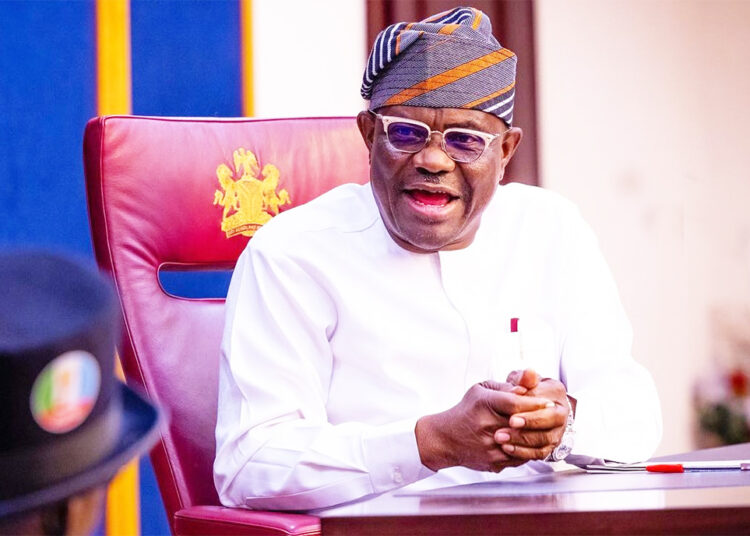A fresh political and legal storm has erupted in Nigeria’s public space following sharp exchanges between prominent human rights lawyer, Femi Falana (SAN), and Nyesom Wike, the Minister of the Federal Capital Territory (FCT), over the recent Supreme Court decision concerning the defection of 27 lawmakers from the Peoples Democratic Party (PDP) to the All Progressives Congress (APC) in Rivers State.
The controversy began when Wike, during a press conference in Abuja, accused Falana of deliberately misrepresenting the apex court’s ruling on the status of the defecting lawmakers. Wike claimed that the matter had been conclusively settled by the Supreme Court, and described Falana’s remarks on national television as a dangerous distortion of legal facts.
“A few days ago, the Supreme Court settled this matter of defection,” Wike said. “If someone of Femi Falana’s caliber can go on national television and lie, it’s very serious. Lies can cause a lot of crisis.”
Wike’s accusation drew a swift and emphatic response from Falana, who described the minister’s claims as “spurious, baseless, and tendentious in every material particular.” In a statement titled “I Did Not Lie Against the Supreme Court of Nigeria,” released on Sunday, the senior advocate defended his remarks as factual, constitutional, and grounded in judicial precedence.
“All I said was that the matter of the defection of the 27 legislators was raised suo motu and determined by the eminent Justices of the apex court,” Falana explained. “My comment was based on the undeniable fact that the vexed issue of the defection was pending in the Port Harcourt judicial division of the Federal High Court at the material time.”

Falana stressed that his position was neither novel nor speculative, pointing to video evidence and sworn affidavits in which the lawmakers themselves admitted to switching political parties. He questioned why Wike, who once celebrated the same judgment with a thanksgiving service, would now turn around to attack him for simply discussing its legal implications.
“However, he decided to attack me for commenting on the same judgment without any legal justification,” Falana said. “To that extent, he has failed in his desperate bid to incite the Justices of the Supreme Court against me.”
He also expressed concern about the broader implications of the ruling. According to Falana, the Supreme Court’s decision—suggesting that defection can only be proved with the production of a political party’s membership register—may be exploited by unpatriotic politicians to normalize political cross-carpeting, a practice he called “political prostitution.”
Falana urged the judiciary to return to well-established precedents such as Attorney-General of the Federation v. Atiku Abubakar (2007), Dapialong v. Dariye (2007), and Abegunde v. Ondo State House of Assembly (2015), which held that legislators who defect without just cause should automatically lose their seats.
On the legal front, Falana asserted his right to critique court rulings, citing Section 39 of the 1999 Constitution and Article 9 of the African Charter on Human and Peoples’ Rights, which guarantee freedom of expression, including the right to challenge and evaluate judicial decisions.
“I wish to state, without any fear of contradictions, that my fundamental right to criticise the decisions of courts is guaranteed,” he said. “While Mr. Wike believes that it is a professional anomaly to criticise the decisions of Judges, the Supreme Court of Nigeria has always welcomed the criticism and review of its judgments because the Justices believe that they are prone to make mistakes like all mortals.”

In a sharp jab, Falana remarked that only a corrupt lawyer wins every case in every court, suggesting that critique and judicial review are signs of a healthy legal system—not misconduct. He further challenged Wike to file a formal complaint with the Legal Practitioners Disciplinary Committee if he genuinely believed Falana had engaged in professional wrongdoing.
“Mr. Wike is the only Life Bencher in Nigeria who has never handled a case in any trial or appellate court,” Falana quipped, adding that Wike should not assume the role of an “unsolicited defender of the Nigerian judiciary.”
The senior advocate concluded by urging legal practitioners, political leaders, and citizens alike to uphold the spirit of constitutionalism, rule of law, and open discourse in a democratic society.
“In the light of the foregoing, it is indubitably clear that the allegation leveled against me by Mr. Wike is spurious and tendentious in every material particular,” Falana said. “I will not be intimidated.”
Sources




